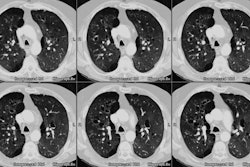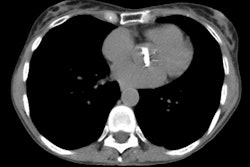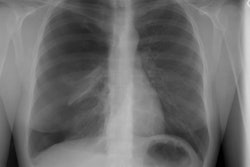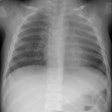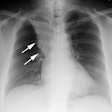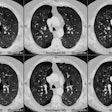Lung function 4 years after lung volume reduction surgery for Emphysema.
Gelb AF, McKenna RJ Jr, Brenner M, Schein MJ, Zamel N, Fischel R
Study objectives: Current data for patients > 2 years after lung volume reduction surgery (LVRS) for emphysema is limited. This prospective study evaluates pre-LVRS baseline data and provides long-term results in 26 patients. INTERVENTION: Bilateral targeted upper lobe stapled LVRS using video thoracoscopy was performed in 26 symptomatic patients (18 men) aged 67 +/- 6 years (mean +/- SD) with severe and heterogenous distribution of emphysema on lung CT. Lung function studies were measured before and up to 4 years after LVRS unless death intervened. RESULTS: No patients were lost to follow-up. Baseline FEV(1) was 0.7 +/- 0.2 L, 29 +/- 10% predicted; FVC, 2.1 +/- 0.6 L, 58 +/- 14% predicted (mean +/- SD); maximum oxygen consumption, 5.7 +/- 3.8 mL/min/kg (normal, > 18 mL/min/kg); dyspneic class >/= 3 (able to walk 200 mL and/or FVC > 400 mL was noted in 73%, 46%, 35%, and 27% of patients, respectively; a decrease in dyspnea grade >/= 1 in 88%, 69%, 46%, and 27% of patients, respectively; and elimination of oxygen dependence in 78%, 50%, 33%, and 22% of patients, respectively. The mechanism for expiratory airflow improvement was accounted for by the increase in both lung elastic recoil and small airway intraluminal caliber and reduction in hyperinflation. Only FVC and vital capacity (VC) of all preoperative lung function studies could identify the 9 patients with significant physiologic improvement at > 3 years after LVRS, respectively, from 10 patients who responded 3 years in 9 of 26 patients with emphysema primarily due to both increased lung elastic recoil and small airway caliber and decreased hyperinflation. The 9 patients had VC and FVC greater at baseline (p < 0.01) when compared to 10 short-term responders who died < 4 years after LVRS.

